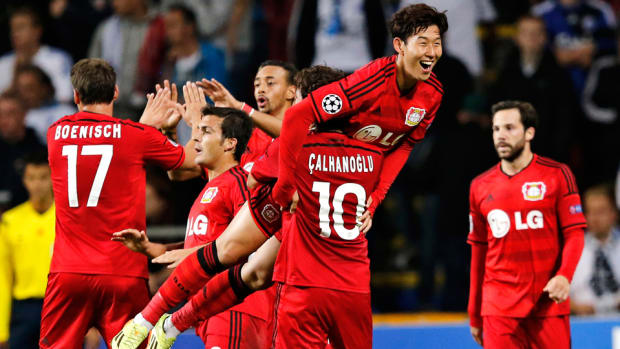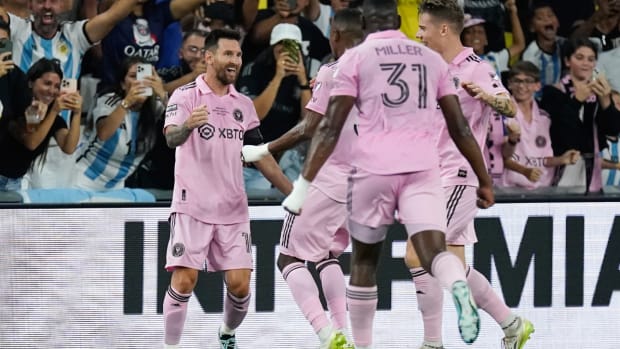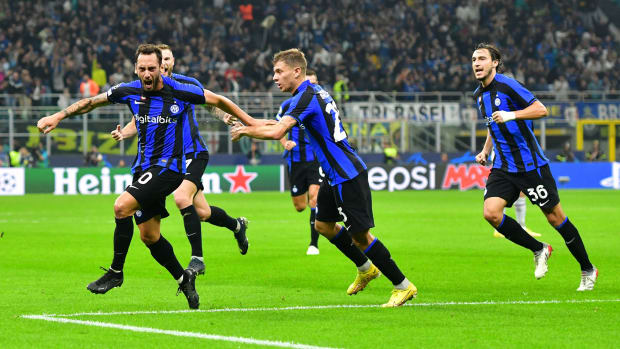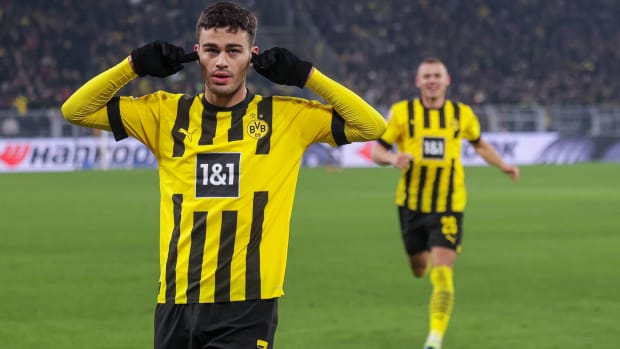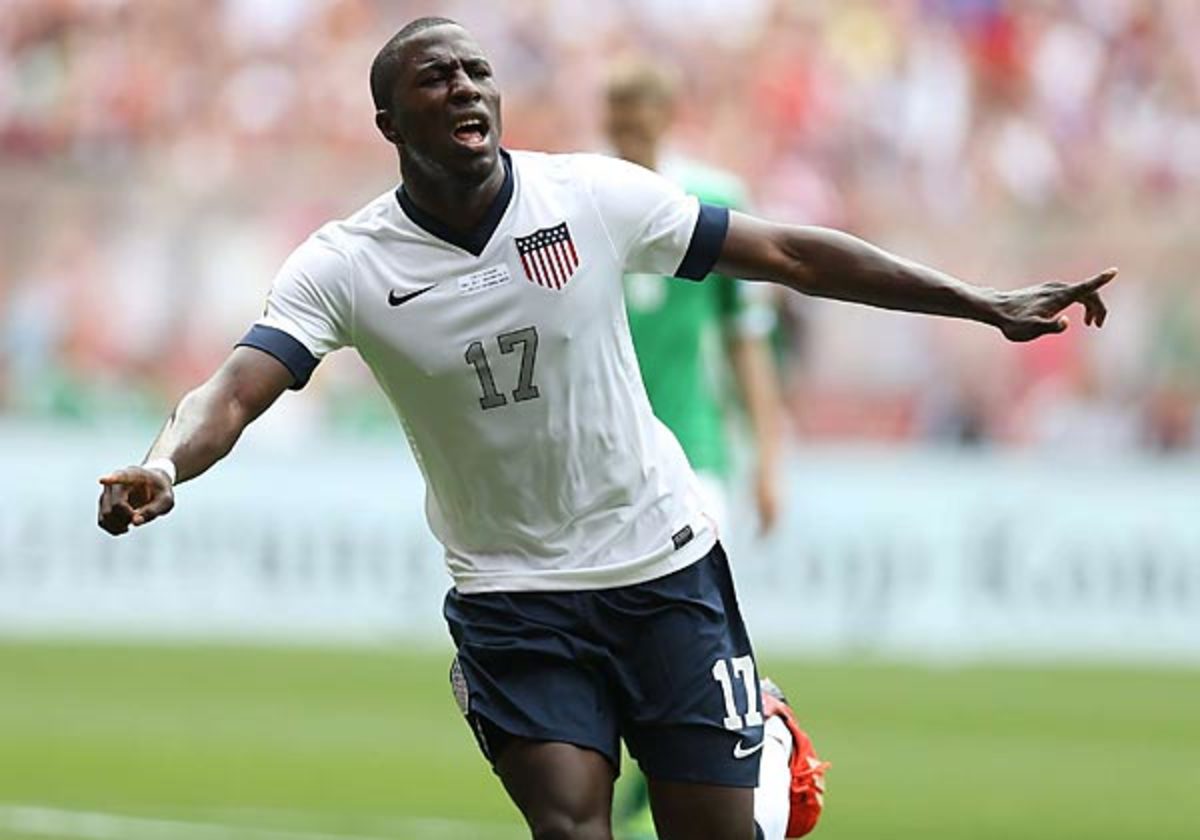
The Fight For 23: Fierce battle among forwards as U.S. looks to break dubious drought
Jozy Altidore figures to be a lock for Brazil despite his club form, but can he rediscover his scoring touch? (Simon Bruty/SI)
STANFORD, Calif. – It’s an ugly statistic, no matter how the time is measured – whether it’s in years (12), games (eight) or minutes of action (832).
Since Brian McBride scored his famous goal against Mexico early in the second round of the 2002 World Cup, U.S. national team forwards have been shut out on soccer’s biggest stage. It’s a trend that underpins one of the most pressing issues facing the American game – developing players with the skill and technique to score consistently at the international level.
Enter Jurgen Klinsmann, who knows a thing or three about playing striker. The “Golden Bomber” was one of the most productive scorers of his generation and won both the World Cup and the European Championship with Germany. Now the U.S. coach, Klinsmann has tested a variety of players and systems in an effort to find the right World Cup combination and now has access to the deepest pool of U.S. strikers in years.
STRAUS: Dempsey back in form, relishing captaincy as Brazil beckons
His predecessor, Bob Bradley, preferred to deploy Landon Donovan and Clint Dempsey on the midfield flanks and struggled to find World Cup-ready forwards. In 2010, Charlie Davies was injured, Jozy Altidore was 20 years old and Edson Buddle, Robbie Findley and Herculez Gomez had fewer than 15 caps combined. Midfielders scored all five U.S. goals in South Africa.
The landscape has changed four years on. Dempsey and Donovan are listed among the six forwards on Klinsmann’s 30-man preliminary World Cup roster. Aron Jóhannsson and Terrence Boyd are two of the more promising dual-nationals recruited to represent the U.S. (the former by Klinsmann, the latter by former U-20 coach Thomas Rongen) and score regularly in Europe. Altidore is four years older and despite a tough season in England has proven his worth in a U.S. uniform. And Chris Wondolowski, who has been lighting up MLS since 2010, finally found his international groove last summer.
Several talented players, like Gomez, Eddie Johnson and Juan Agudelo, failed to crack the final 30, offering further confirmation that the forward corps is deeper than ever and ready, perhaps, to make a difference.
“I didn’t realize that,” Wondolowski said when told of the World Cup scoring drought. “We like to think that each time it’s a new page, a new slate, and we’re going to go out there and just try to play to the best of our ability.”
But with more possibilities come more permutations, and Klinsmann has several tough decisions to make. He’ll bring four or five forwards to Brazil, depending partly on which midfielders make the cut, and also will have several formations from which to choose.
He’s opted most frequently for a 4-2-3-1, which features a target striker high against the opposition defense and supported (assuming everything goes to plan) by a withdrawn playmaker and attackers on each flank. He’s also played a 4-4-2, which has been effective for the U.S. late in games when it needs a goal. Klinsmann tweaked that system further in an April friendly against Mexico, where a diamond midfield and forward pairing of Dempsey and Wondolowski had its way with El Tri during an electric first half.
Speaking here at Stanford University, where the U.S. has begun preparing for the World Cup, players were confident that they’ll be able to transition seamlessly from system to system once they’re in Brazil.
“The beauty of playing at this level with so many good soccer players is you can change things quickly and guys figure it out,” Donovan said. “It’s hard to know exactly how were going to play and in what way… that’s the coaches’ job to do that. We’re all very smart soccer players and we can figure it out and that’s’ nice to have that.”
Klinsmann has to finalize his team and his tactics soon. The 23-man roster is due to FIFA on June 2, the day after the U.S. meets Turkey in a Red Bull Arena friendly. The Americans entertain Nigeria before departing for Brazil and then kick off the World Cup against Ghana on June 16 in Natal.
There is no safe bet for the opener, but the best bet on a starting lineup that day likely would include Altidore leading a 4-2-3-1 with Dempsey behind him in a hybrid midfielder/forward role. As good as the 4-4-2 has looked on the attack, the five-man midfield offers defensive cover that might be critical against the likes of Ghana, Portugal and Germany.
CREDITOR: U.S. foe Portugal names final 23-man World Cup roster
Altidore scored just twice in all competitions for Sunderland in 2013-14 but promised here that he’s the “same guy I was before,” back when he was finding the net at will for AZ Alkmaar. Altidore also struck eight times for the U.S. last year en route to federation Player of the Year honors. He hinted this week that he would prefer playing with more support.
Aron Johannsson (9) picked up where Jozy Altidore left off at AZ Alkmaar this season, scoring 26 goals in all competitions. (Scott Heppell/AP)
“The Mexico game [featuring the 4-4-2] was awesome. I watched and I thought the team was so fluid,” he said, adding later that he thought he had some difficulty at Sunderland because of the lack of interplay with his teammates.
“At Alkmaar, they focused more on soccer play,” he said. “I think that’s coincidentally why [Sunderland] stayed up [in the Premier League]. I think we went away from that safe direct play and we played a little bit more. We put teams on the back foot, and that’s why we created the chances we did and we stayed up at the end.”
Dempsey could focus on connecting with Altidore while Michael Bradley and Jermaine Jones hold down the fort in midfield, but his prowess as a scorer shouldn’t be ignored. The U.S. captain led all Americans with eight World cup qualifying goals and needs to be deployed far enough forward so he can create and finish chances.
Jóhannsson, 23, would be a different sort of complement to Altidore and presents an intriguing option. The Alabama-born, Iceland-raised striker stars for Altidore’s old club, AZ, and may be the most technically gifted attacker at Klinsmann’s disposal. He boasts outstanding touch, can beat defenders one-on-one and scored 26 goals this season. But as Altidore demonstrated this year, success in the Netherlands doesn’t necessarily translate immediately to the next level.
A similar question faces Boyd, 23, who tallied 20 goals for Austrian Bundesliga runner-up Rapid Vienna. The Austrian league is rated well below the Dutch circuit and Boyd has yet to score in 13 appearances for the U.S. But he has the athleticism and temperament to give the Group of Death something to think about.
“I think that I’m like one of these tanks up front. Yeah. That’s what I think. You want to play against me,” he asked this week. “I’m just playing simple … I’m just an easy player [and] I’m just coming with my will, I’m just playing aggressive and trying to get defenders to make mistakes.”
While Boyd hopes to provoke mistakes, Wondolowski will look to capitalize on them. No one moves through the penalty area like the San Jose Earthquakes captain, a former benchwarmer who won the MLS MVP award in 2012 and who has scored an impressive 78 league goals in the past four-plus seasons. He likely wouldn’t start in Brazil but is the sort of player who might be an ideal addition off the bench if the U.S. needs a goal late. He reads the game as well as anyone in camp.
WAHL: Altidore looks to regain scoring touch after rough club campaign
“He doesn’t have to do anything different than he’s done over the last year,” Klinsmann said of Wondolowski. “It’s always a pleasure to have him in camp. He is determined. You give him a one percent chance and he wants to make it 100 percent at the end of the day. He will be one of those drivers going into the next couple of weeks.”
Last but not least, there’s Donovan, the program’s all-time leading scorer. Klinsmann said when he unveiled his 30-man team that he sees the 32-year-old “clearly as a striker,” – perhaps a sign that the speed Donovan once used to destroy defenses on the counterattack isn’t what it was. However, Donovan’s versatility and comfort in other positions should make a difference on cut-down day.
Nevertheless, Donovan knows he won’t be handed a ticket to Brazil based on past heroics and that he must earn his spot over the next few weeks. He’s yet to score for the L.A. Galaxy this season -- remaining tied with Jeff Cunningham for 134 regular season goals, an all-time MLS record -- and now represents one of several tough choices the coaching staff must make as the World Cup approaches.
“He gets evaluated every time he comes in, and I’m straightforward with him every time that I see him,” Klinsmann said. “I obviously watched many of his games this season, like I watch the games of all the other guys, so he goes through the same evaluation process as everybody else. He has to win a spot and convince the coaches that it’s the right decision to have him be a part of the team.
"It’s just normal. For me this is very, very normal, and again, with all the appreciation, with all the admiration for what he’s done throughout his career, which is extraordinary and deserves the compliments that he gets, but soccer is about what happens today and what you do today, and what you hopefully do tomorrow.”


